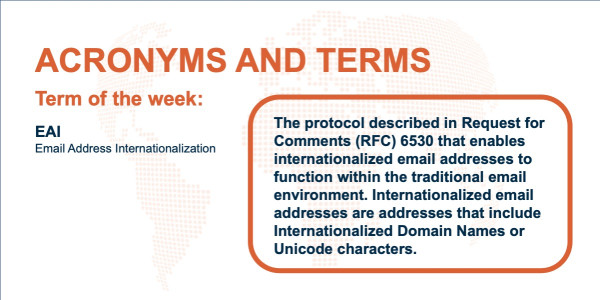My journey into Internet governance
A blog from Vivien Maidaborn — Tumu Whakarae | Chief Executive — InternetNZ •

A few weeks ago, I flew to Washington DC to attend ICANN 77. The ICANN meetings are held three times a year and take place all over the globe. This meeting in Washington attracted 1,102 people in person and 620 virtual participants. These people represented 108 countries!
It was my first international Internet Governance event. These are my thoughts on what I learnt, how the puzzle pieces have come together for me, and how this event cemented the value of community voices in the future of the Internet.
Ten months ago, I had no idea what ICANN was. I'd never even heard of it. And even now, I find it hard to remember what those letters stand for — Internet Corporation for Assigned Names and Numbers.
Actually, my very first impression of ICANN is the sheer amount of acronyms.

The GAC, the ccNSO, the GNSO, the OCTO… I walked around trying to make sense of the jargon and what bits of it relate to us here in Aotearoa. And of course, our core business of running .nz relates to another acronym, ccTLD (Country Code Top Level Domain).
The phrase I found hardest to really get inside of is ‘Internet governance.’ I get Internet, and I get governance, but I could sense the two together contained a whole lot of meaning more than the words convey.
This was my mission at ICANN. To meet key people, to understand the meeting structure itself, and to figure out which meetings we should be at and which ones we don't need to be at. And also to look into what is ‘Internet governance’ and where we come in. It was internet governance 101 for a new person at ICANN.
What is ICANN?

ICANN is a non-profit org and has a community of participants from all over the world. It has a strong focus on the Internet's global Domain Name System (DNS). It works on policy development for the internationalisation of the DNS, introduction of new generic top-level domains (like .com and .org) and the operation of root name servers.
It regulates the DNS by entering into contracts with domain name registries and registrars.
The ‘Internet community’ is a huge part of ICANN. It emerged out of a recognition that Internet governance needed to mirror the global nature of the Internet, like the Internet's domain name system itself. Its primary characteristic is that it represents multiple stakeholders — civil society, governments, business, and academic members — because by including all sectors of society, it would avoid control of Internet infrastructure by governments (who are probably pretty territorial) or business (who are profit seeking).
ICANN gets its regulatory power by acting as the gatekeeper of the DNS root. And it awards registries top level domain names only if they sign contracts with ICANN.
The work of ICANN is to bring this multi stakeholder community together and to agree the policies that sit behind these contracts with registries.
Those policies are developed in the multi stakeholder environment and that needs to happen through bottom up policy development structures such as the ccNSO (which is the Country Code Names Supporting Organisation). InternetNZ largely participates in the ccNSO and its various working groups and committees, but we also keep in touch with the ‘at large’ stream of activity.
The reason for community developed policy is to manage the risk of ICANN being the policy setter in a monopoly market. Policies must be the product of a collectively binding public process where a broad set of Internet stakeholders are represented.
There's so much learning in this exploration.
Firstly, the wonder of a global Internet — not controlled by government or business — but rather multi stakeholder collaboration.
I worked for the UN for 10 years. The UN thinks it's really the only global infrastructure that enables decisions for the collective good of all people.
But here I am, in this environment that doesn't have the UN or ‘States’ as the only member parties. No wonder the multi stakeholder environment is so important.
The internet community has come alive to me through this process.
The importance of convening and creating space for the Internet community of New Zealand has come alive for me through being at ICANN. InternetNZ has a unique role to connect with and convene the Internet community of Aotearoa so that our unique community, experiences, knowledge, and questions can be introduced into the ICANN multi stakeholder space.
One of the things that happened at ICANN is that many people I met from around the world — people from Botswana, Vanuatu, Australia, Sweden — all started our conversation saying how important it was that New Zealand was at these meetings.
How important our voice is and how respected our work is, particularly in terms of the grassroots Internet community. Many people mentioned NetHui for example and mentioned they had been or wanted to come.
So I've come home feeling amazed by the breadth and depth of Internet governance. I’ve been inspired by the technical people at ICANN doing the hard yards figuring out how the numbers relate to the names. And how we keep working towards an Internet that includes everyone through universal acceptance projects or work that is being done on strings to make sure that the security of the DNS is not affected by introducing new non-Latin alphabets.
I feel like I've parted the veils of mist created by acronyms and jargon.
I do feel like I have the first pieces of the puzzle towards identifying what InternetNZ’s role is in this work of Internet governance.
Looking ahead, the regional Asia Pacific Regional Internet Governance Forum will be held in Brisbane at the end of August. Because it's so close to us, that's an opportunity for a significant group — including some council members, members and staff — to go and involve ourselves in this community.
I’m really excited to keep engaging, keep learning, and discover how the international Internet community can help Aotearoa — and how Aotearoa can help the international Internet community.
This photo was taken at the ICANN 77 final networking event. InternetNZ President, Joy Liddicoat (left) and InternetNZ CE, Vivien Maidaborn (right)